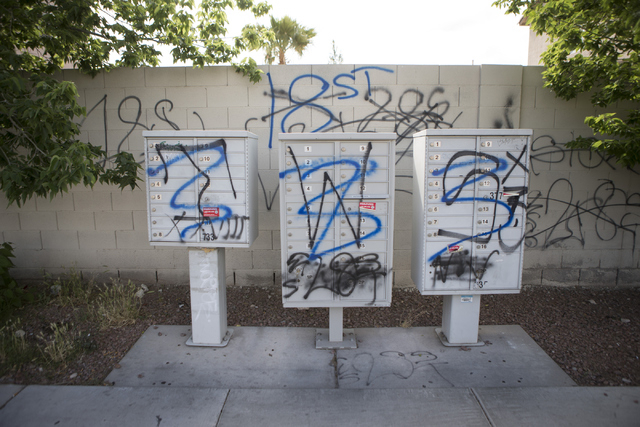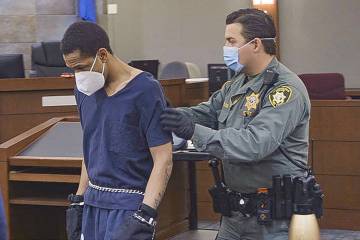Metro to devote semipermanent unit to violent crime initiative through summer
The Metropolitan Police Department said it will dedicate a semipermanent unit to the department’s violent crime initiative through the summer in a change of course coinciding with the recent crime wave.
Rather than rotating plainclothes officers, detectives and supervisors into two-week patrol shifts, the dedicated unit will target high-crime areas in the valley until a new set of recruits is ready for duty at the end of the summer.
Assistant Sheriff Todd Fasulo told the Las Vegas Review-Journal that the unit will consist of one lieutenant, two sergeants, 20 officers and a few detectives.
“We’re putting a little more permanency to it over the next couple months,” Fasulo said Tuesday.
The sheriff’s violent crime initiative was announced in March in response to a valleywide spike in violent crime this year. Homicides in Metro’s jurisdiction are up about 91 percent so far this year over the same time period in 2015. Robberies, rapes and aggravated assaults have increased by 20 percent to 25 percent this year.
The policy elicited criticism from the department’s police unions, who claimed the officers weren’t prepared to go back on patrol. But union leaders spoke positively of the updated model.
Union leaders see this change as a positive step and an indication that the department is taking officers’ concerns into consideration.
“At this time I feel (the department) is trying very hard to handle a very difficult crime problem with not enough officers to do it,” Lt. John Faulis, chairman of the Las Vegas Police Managers and Supervisors Association said in an email Wednesday.
When the policy was first initiated, Fasulo said it seemed to be having a positive effect.
He said the department didn’t have “long-term sustained statistics” to point to, but Metro went about a week and a half without a homicide after the policy went into effect. Before that, the agency was averaging a homicide every 48 hours.
Fasulo said the department will have better metrics for evaluating the program’s efficacy as the summer unfolds.
Police have said the initiative is meant to get the department through the summer — a fresh crop of recruits should be finished with field training and ready for patrol duty in early fall.
The More Cops sales tax increase went into effect Jan. 1, but training officers takes months. At least 40 recruits are in field training, which means they are working with a patrol partner. When that training is done in the next few months, those officers can work solo and Metro can distribute them throughout the valley.
Another round of new cops is expected toward the end of the year.
Police union leaders in March criticized the policy: Mark Chaparian, the executive director of the Las Vegas Police Protective Association, attributed the spike in violent crimes to Metro’s decentralization of specialized units in July. Faulis has said that many of the officers being thrown into patrol shifts have been out of the urban policing model and weren’t prepared.
When asked whether having a semipermanent squad would allay those kinds of concerns, Fasulo just said every officer has the same duty.
“Every cop in this police department has a responsibility to fight crime. No one is immune,” he said.
He said that department administrators are looking into having plainclothes officers and detectives work patrol shifts on a “semiregular basis” as a refresher to the officers.
“The unions did a fantastic job of identifying that gap for us,” he said.
Chaparian said the change is reminiscent of the department’s saturation team — a comparison Fasulo also made — that was disbanded during decentralization. The saturation teams were problem-solving units charged with targeting specific high-crime areas.
“The way the VCI (violent crime initiative) was rolled out was not ideal. We’re getting back to what works,” he said. “I think using a different name kind of helps them save face, and that’s fine.”
Chaparian lauded the sheriff’s efforts to make things better, but said decentralization just doesn’t work for Las Vegas.
“It seems the department is learning that change isn’t always good,” he said.
Contact Wesley Juhl at wjuhl@reviewjournal.com and 702-383-0391. Find him on Twitter: @WesJuhl




























